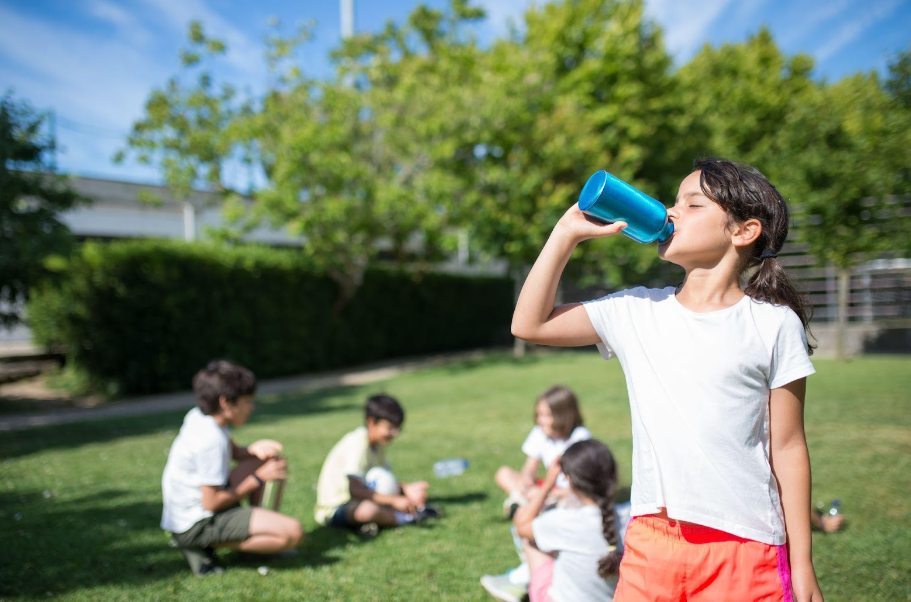What Parents Need to Know About Preventing Heat-Related Illnesses
What Parents Need to Know About Preventing Heat-Related Illnesses

Summer's beauty offers enriching experiences, but it also presents unique challenges to parents and children. Children are at an increased risk for heat-related illnesses as temperatures rise during this season. As a parent, it's essential to prevent these conditions and keep your child safe in hot and humid weather.
Read on as we discuss the different
heat-related illnesses and how you can ensure your child stays healthy and happy all summer.
Dehydration
Dehydration occurs when your body loses a lot of water through sweating—which are not replenished by drinking enough fluids. Symptoms of dehydration can be mild or severe. It can include headaches, dizziness, fatigue, dry mouth, and even confusion. Children are particularly vulnerable to dehydration, especially during hot weather and excessive physical activity.
To prevent dehydration, it's important to encourage your child to drink plenty of fluids throughout the day. Water is the best choice, but sports drinks with electrolytes can be helpful too—especially for children who are very active or sweat a lot. Ensure your child has access to water or other beverages during outdoor activities, and encourage them to take frequent breaks and rehydrate.
If your child shows signs of
dehydration, encourage them to rest in a cool, shady place and drink fluids slowly. Seek medical attention if symptoms are severe or don't improve after drinking fluids.
Electrolyte Imbalance
As the temperature rises, it's important to keep your child hydrated and maintain a balance of electrolytes in their body. Electrolytes, such as sodium, potassium, and chloride, play a vital role in regulating muscle and nerve function. When your child sweats excessively in hot weather, they can lose electrolytes, causing an imbalance in the body.
Muscle cramping, nausea, headaches, weakness, and confusion are a few symptoms of an electrolyte imbalance. If left unattended, it can lead to seizures and coma. So, it's important to ensure your child consumes a balanced diet with adequate electrolytes. Encourage your child to drink plenty of electrolyte-enhanced sports drinks if they participate in prolonged outdoor activities. Additionally, foods such as bananas, avocados, spinach, and coconut water can help replenish electrolytes lost through sweat.
Remember to monitor your child for signs of dehydration, as it can also lead to an electrolyte imbalance. Ensuring your child is adequately hydrated and consuming electrolyte-rich foods and drinks can help prevent the development of heat-related illnesses.
Heat Syncope
Heat syncope is a type of heat-related illness that typically occurs when the body is unable to regulate its temperature properly. It happens due to prolonged exposure to high temperatures or humidity or when engaging in physical activity in hot weather. The condition is characterized by a sudden drop in blood pressure, which can cause a person to feel lightheaded, dizzy, and faint.
People who experience heat syncope may also experience a feeling of weakness, tunnel vision, and blurred vision. The fainting or collapse is usually brief, and people typically recover quickly. However, in some cases, the individual may need medical attention—particularly if the fainting episode is prolonged or if there are signs of a more serious heat-related illness.
Heat syncope is more likely to occur in individuals and kids who are not acclimatized to hot weather, are dehydrated, or have underlying medical conditions that affect their ability to regulate their body temperature.
Heat Exhaustion
Heat exhaustion is a common heat-related illness that can occur when the body becomes dehydrated and overheated. Symptoms of heat exhaustion include dizziness, weakness, nausea, headache, muscle cramps, and heavy sweating.
Children and teens participating in sports or outdoor activities during summer are particularly susceptible to heat exhaustion. Parents should ensure that their children increase their fluid intake during hot weather to prevent this condition.
If your child is experiencing symptoms of heat exhaustion, move them to a cool, shaded area and have them lie down with their feet elevated. Drinking fluids to replace lost electrolytes is a great way to keep the body active and hydrated.
In some cases, heat exhaustion can lead to heat stroke, a much more severe condition that requires immediate medical attention. So, it is important to be aware of the signs of heat exhaustion and take steps to prevent it from occurring.
Heat Stroke
Heat stroke is the most severe form of heat-related illness and can be life-threatening if not treated promptly. It occurs when the body's internal temperature rises to a dangerous level, causing damage to the brain and other organs. Symptoms of heat stroke include confusion, dizziness, nausea, headache, rapid breathing, a high body temperature, and increased heart rate.
If you suspect your child is experiencing a
heat stroke, it is essential to seek immediate medical attention. While waiting for emergency services, move the child to a cool area, remove any unnecessary clothing, and cool their body by applying wet towels or a cool bath.
Keeping your child cool and hydrated during hot weather is crucial to prevent heat stroke. Kids should drink electrolyte-rich fluids and avoid activities during the hottest part of the day. Dress your child in lightweight, breathable clothing, and use a fan or air conditioner to maintain a cool temperature indoors.
Know the Signs
Heat-related illnesses can range from mild to severe and may include the following symptoms:
Heat Cramps: Painful muscle cramps and spasms in the legs, arms, or abdomen. These can be early signs of heat exhaustion.
Heat Exhaustion: Heavy sweating, weakness, dizziness, headache, nausea or vomiting, cool and moist skin, fast or weak pulse, and fainting.
Heatstroke: High body temperature (above 104°F), hot and dry skin, rapid pulse, headache, dizziness, confusion, unconsciousness, seizures, and even death if left untreated.
Prevention
Heat exhaustion and heat stroke are serious conditions that can lead to hospitalization and even prove fatal. Therefore, taking preventative measures can help keep your child safe and healthy.
Hydration
Ensure your child drinks plenty of water throughout the day, even if they don't feel thirsty. Encourage them to drink water during outdoor activities at regular intervals, and provide them with a water bottle they can carry with them.
In addition to drinking plenty of water, your child should also be eating foods high in water content, such as fruits and vegetables. This can help keep them hydrated and provide them with essential nutrients that can help their bodies function properly.
Dressing Appropriately
Loose-fitting, lightweight clothing made of breathable fabrics like cotton or linen can help keep your child comfortable and prevent overheating. These fabrics allow air to circulate and wick away sweat, keeping your child's skin dry and cool.
On the other hand, dark-colored clothing tends to absorb more heat from the sun, making your child feel even hotter. Tight-fitting clothes can restrict airflow and trap heat against your child's body, leading to overheating.
For example, if your child is playing sports, it's best to choose clothes designed for athletic activities that also provide adequate ventilation. This type of clothing is typically made of moisture-wicking fabric, which pulls sweat away from the skin and allows it to evaporate, keeping your child cool and dry.
Avoid Too Much Heat
It's also important to limit outdoor activities during the hottest parts of the day, typically between 10 am and 4 pm. If your child is usually outdoors during this time, ask them to take frequent breaks to prevent over-exhaustion. Creating a cool environment in your home can help keep the temperature down and prevent heat-related illnesses. Leaving kids in the car is an absolute no-no, as it can severely impact the health of the child and could even prove fatal.
Use Sunscreen
Sunburn can cause pain and discomfort and increase the risk of skin cancer. Therefore, it's crucial to choose a sunscreen with a minimum SPF of 30 and apply it to all exposed areas of the body, including the face, ears, and neck. When choosing a sunscreen for your child, look for a broad-spectrum sunscreen that is safe for children's use.
Prevention is vital to maintaining good health. It's important to familiarize yourself with the signs and symptoms of these illnesses so you can take action if needed. At
Rocky Vista Health Center, we understand the importance of preventing illness in children. Our team of experienced healthcare providers is dedicated to providing comprehensive care to our patients, including education on preventing heat-related illnesses. We offer a wide range of services, including wellness visits, immunizations, and acute care, to help keep children healthy all year round.
We also offer educational resources for parents to help prevent illnesses in children. Our healthcare providers can provide individualized advice on keeping children safe in the heat, and we offer educational materials on our website and in our office. We encourage parents to schedule wellness visits for their children to ensure they are up-to-date on their immunizations and to discuss any concerns they may have about their child's health.
Visit us today or call us at
(720) 875-2880 to
schedule an appointment!
Keep Your Friend's Informed



